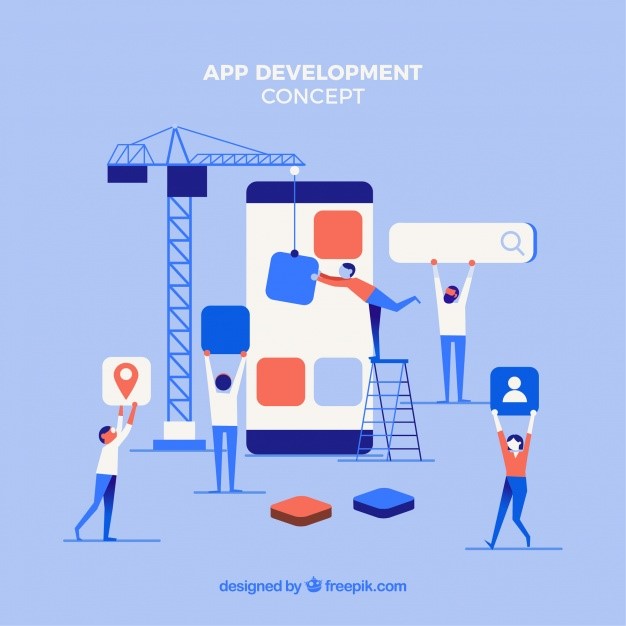Table of Contents
Every day, hundreds and thousands of mobile apps hit the mobile market. While some of these apps are meant for entertainment, others are used for communication, running businesses, learning new concepts, and much more – implying mobile market is getting flooded by apps related to all the business domain.
In a scenario like this, the simplest yet effective method to ensure that you develop a perfect mobile app and leverage the benefits of making your mobile presence is to follow the mobile applications development process religiously.
Wondering what a mobile apps development process is? What are the different stages and what factors to consider to ensure a profitable outcome? If so, this blog will be a good read for you.
A mobile application development process, in simpler terms, is a series of stages/steps following which an app idea is converted into a real application and made to enter the market.

Idea Verification
The initial stage of the app development process is idea verification. In this phase, you are supposed to perform extensive market research and competitive analysis to ensure that the idea is genuine, unique, and required in the market.
In other words, this phase involves looking into whether there’s any profit of developing this application or not so that you could save the efforts, time and funds that will be invested into the idea.
Monetization Strategy Curation
Considering the ultimate goal of app development is earning money most of the time, the next stage is to decide which app monetization strategy is apt for your mobile app and how to introduce it into your app development plan.
Pre-Development Checklist
The next thing that falls into the mobile app development process is to make a checklist of all the features, functionalities and technologies you want to introduce in your application and how you want to arrange them on each app screen.
Proper planning of all these factors before getting into the development mode will help you to pick the right tech stack and streamline the overall activities, which will eventually foster better results.
UI/UX Design
Once proper planning is done after having a discussion with your hired mobile app development company, the next thing to do is UI/UX Design.
Most of the people focus entirely on the coding part, but that is not the right practice. It is the look and feel of the mobile application that prompts the users to download and use the application. So, it is necessary to look into the top UI/UX trends for the year and embrace all the technologies while ensuring a simple yet interactive portal is designed.
Mobile Apps Development
After designing the app screens, the next apps development process stage that comes into the limelight is development. In this phase, the mobile app developers code the functionality of the application so that the app not only looks great but also works impressively.
Here, you communicate with your hired mobile app development company multiple time to ensure that you both remain on the same page and app is developed as per your choice. That means, the developed app performs the desired actions.
In addition to this, the concept of code reusability is also considered to cut down the efforts and cost required to make an app.
Deployment and Testing
The mobile application, once designed and developed appropriately, is deployed and tested using popular alpha and beta testing tools. Each module and app screen is considered to make it certain that no bug remains in the application. Or, any screen does not work in the direction of your pre-development plan.
App Launch
While the mobile applications development process will be iterated if the app has any flaw, it will be prepared for app launch in the other scenario.
In this stage, a developer account is created on the respective App Store, actions related to ASO marketing is considered, and the app is submitted to go live.
App Marketing
In this phase, you look into how to bring more eyeballs to your app page, gain higher downloads and thus, drive higher sales. You consider the best optimal app marketing tools, strategies, and platforms and invest your best efforts into making the best of each opportunity.
Many people prefer investing in app promotion once the app goes live, which makes it the next stage of the apps development process. However, this phase can be considered just after the pre-development planning too.
This is because the process of app marketing when started at an initial stage, helps the businesses to create a hype in the market and enhances the chances of gaining a huge response when the app is launched.
App Maintenance and Update
App Maintenance and Update emerge out as the next stage of apps development process, where we keep an eye on the user response and improve our application accordingly. This implies we begin with the pre-development planning phase again to ensure that the app is developed as per the user demand and it earns higher momentum in the market.
Wrapping Up
The mobile app development process might seem like an optional thing while developing a mobility solution for your business, but it holds paramount importance in success. It can make or break your application’s reputation in the market and influence your overall revenue generated.
So, do not overlook the process or feel the temptation to skip some of the steps in the process. Consider each and every phase religiously and thus, reap higher benefits from creating an application.



